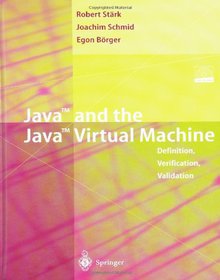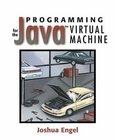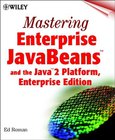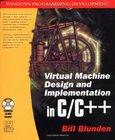Java and the Java Virtual Machine
Definition, Verification, Validation

Book Details:
| Publisher: | Springer |
| Series: | Springer |
| Author: | Robert F. Stark |
| Edition: | 1 |
| ISBN-10: | 3540420886 |
| ISBN-13: | 9783540420880 |
| Pages: | 392 |
| Published: | Jun 20 2001 |
| Posted: | Nov 19 2014 |
| Language: | English |
| Book format: | |
| Book size: | 2.45 MB |
Book Description:
This book provides a high-level description, together with a mathematical and an experimental analysis, of Java and of the Java Virtual Machine (JVM), including a standard compiler of Java programs to JVM code and the security critical bytecode verifier component of the JVM. The description is structured into language layers and machine components. It comes with a natural executable refinementwhich can be used for testing code. The method developed for this purpose is based on Abstract State Machines (ASMs) and can be applied to other virtual machines and to other programming languages as well. The book is written for advanced students and for professionals and practitioners in research and development who need a complete and transparent definition and an executable model of the language and of the virtual machine underlying its intended implementation."The Jbook gives the most comprehensive and consistent formal account of the combination of Java and the JVM." (Pieter Hartel and Luc Moreau in Formalizing the Safety of Java, the Java Virtual Machine and Java Card, ACM Computing Surveys, 33(4):517-558, 2001. Section 6.2, page 540.)
Download Link:
Related Books:
Programming for the Java Virtual Machine
The core of Java technology, the Java virtual machine is an abstract computing machine that enables the Java platform to host applications on any computer or operating system without rewriting or recompiling. Anyone interested in designing a language or writing a compiler for the Java virtual machine must have an in-depth understanding of its binary class format and instruction set. If you are programming with the Java programming language, knowledge of the Java virtual machine will give you valuable insight into the Java platform's security capabilities and cross-platform portability. It will increase your understanding of the Java programming language, enabling you to improve the security and performance of your programs. The author employs a tutor...
Mastering Enterprise JavaBeans and the Java 2 Platform
Enterprise Edition
"This book is a must-have for developers who want to jumpstart their EJB development process. Ed Roman shows the right way to use the J2EE technology with in-depth examples and coding patterns from the real world. We recommend this book as part of our education materials for both in-house staff and customer engagements." - William W. Lee, Chief Technology Officer, The Theory CenterWhat some are calling the best thing to happen to enterprise programming since Java itself, Enterprise JavaBeans (EJB) radically streamlines the server-side application development process. In this book, you'll learn EJB from a developer's perspective---the author cuts through the marketing hype and shows you both the good and the bad in developing real-world EJB ...
Virtual Machine Design and Implementation C/C++
With the emergence of multiplatform production systems and network-centric computing, the software industry has witnessed the resurgence of the virtual machine. Rather than committing to any single operating system, software engineers have embraced platform-neutral development tools and run-time environments. Virtual Machine Design and Implementation in C/C++ provides an in-depth look at the construction and underlying theory of a fully functional virtual machine and an entire suite of related development tools. The book begins with a discussion of the theoretical underpinnings of the author's HEC virtual machine and its fundamental design goals, and continues with a section on the implementation of the virtual machine and its debugger. The final sec...
2007 - 2021 © eBooks-IT.org



